The Internet of Things (IoT) has revolutionized how devices connect and communicate, creating exciting opportunities for tech-savvy individuals.
From smart homes to industrial applications, IoT touches nearly every aspect of our lives and continues to grow rapidly.
You can leverage your IoT skills to generate income in various ways. Whether you’re a developer, data analyst, or hardware expert, there are numerous paths to monetize your knowledge in this expanding field.
Let’s explore some proven strategies to turn your IoT expertise into a profitable venture.
1) Smart Home Consultant
As a Smart Home Consultant, you can leverage your IoT expertise to help homeowners create connected living spaces.
Your role involves recommending and implementing smart devices that enhance comfort, security, and energy efficiency.
You’ll guide clients in selecting the right smart thermostats, lighting systems, security cameras, and voice-controlled assistants.
Your knowledge of various IoT platforms and their compatibility will be crucial in creating seamless integrations.
You can offer services like initial consultations, system design, installation, and ongoing support.
Many homeowners are interested in smart home technology but lack the technical know-how to set it up properly.
By staying up-to-date with the latest IoT trends and products, you’ll provide valuable insights to your clients.
You might specialize in specific areas like energy management or home entertainment systems to differentiate yourself in the market.
Building relationships with suppliers and manufacturers can help you offer competitive pricing and access to the newest technologies.
You could also partner with real estate agents or interior designers to expand your client base.
As smart homes become more common, your services will be in high demand.
You can charge for consultations, installations, and even offer maintenance packages for recurring revenue.
2) IoT Device Repair Specialist

As an IoT Device Repair Specialist, you can tap into a growing market of connected devices that need maintenance and fixing.
With billions of IoT devices in use, there’s a constant demand for skilled technicians.
You’ll work on a variety of smart gadgets, from home automation systems to industrial sensors.
Your expertise will cover troubleshooting connectivity issues, replacing faulty components, and updating firmware.
To succeed in this role, you’ll need a solid understanding of IoT protocols, wireless technologies, and basic electronics.
Familiarity with popular IoT platforms and manufacturers is also crucial.
You can offer your services to individuals, businesses, or even partner with IoT device companies.
As devices become more complex, your skills will become increasingly valuable.
Consider specializing in specific types of IoT devices or industries to stand out in the market.
For example, you could focus on smart home systems, wearable tech, or industrial IoT equipment.
To build your clientele, showcase your expertise through online tutorials or blog posts.
You can also offer diagnostic services remotely, expanding your reach beyond your local area.
As the IoT landscape evolves, staying updated with the latest technologies and security practices is essential.
This career path offers both technical challenges and the satisfaction of helping people keep their smart devices running smoothly.
3) Wearable Tech Developer
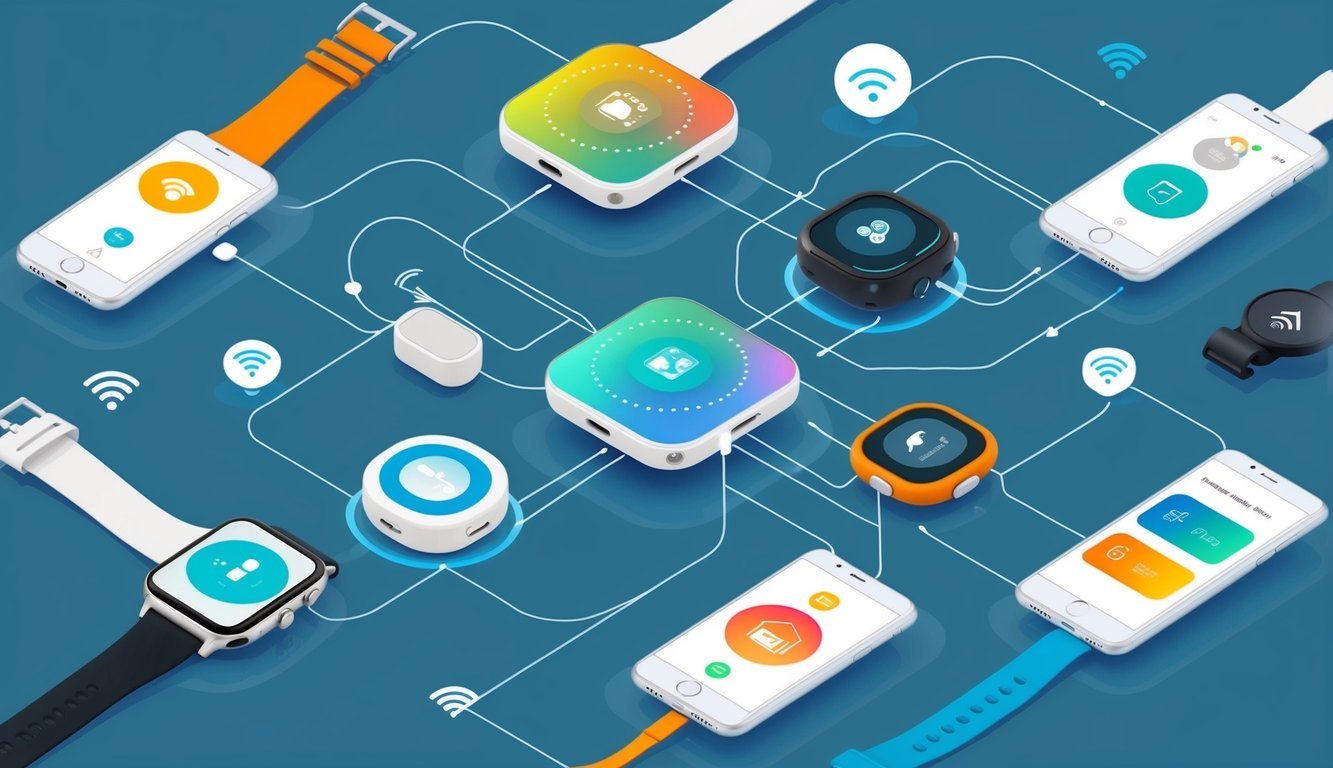
As a wearable tech developer, you can tap into a booming market within the IoT ecosystem.
Smartwatches, fitness trackers, and augmented reality glasses are just a few examples of the devices you could work on.
Your skills in hardware design, software development, and data analytics will be in high demand.
You’ll need to create user-friendly interfaces and ensure seamless connectivity with other devices and platforms.
Health and fitness applications are particularly popular in the wearable space.
You might develop features that track heart rate, sleep patterns, or even stress levels.
These can provide valuable insights to users and healthcare professionals alike.
Security is another crucial aspect of wearable tech.
You’ll need to implement robust measures to protect users’ sensitive data, especially when dealing with health-related information.
As the field evolves, you could find yourself working on cutting-edge projects like smart clothing or biomedical implants.
The possibilities are expanding rapidly, offering exciting opportunities for innovation.
To succeed in this role, stay updated with the latest trends and technologies.
Attend industry conferences, participate in online forums, and experiment with new devices.
Remember, user experience is key in wearable tech.
Your creations should be comfortable, intuitive, and genuinely useful in people’s daily lives.
By focusing on these aspects, you can build a rewarding career in this growing field.
4) Industrial IoT Technician
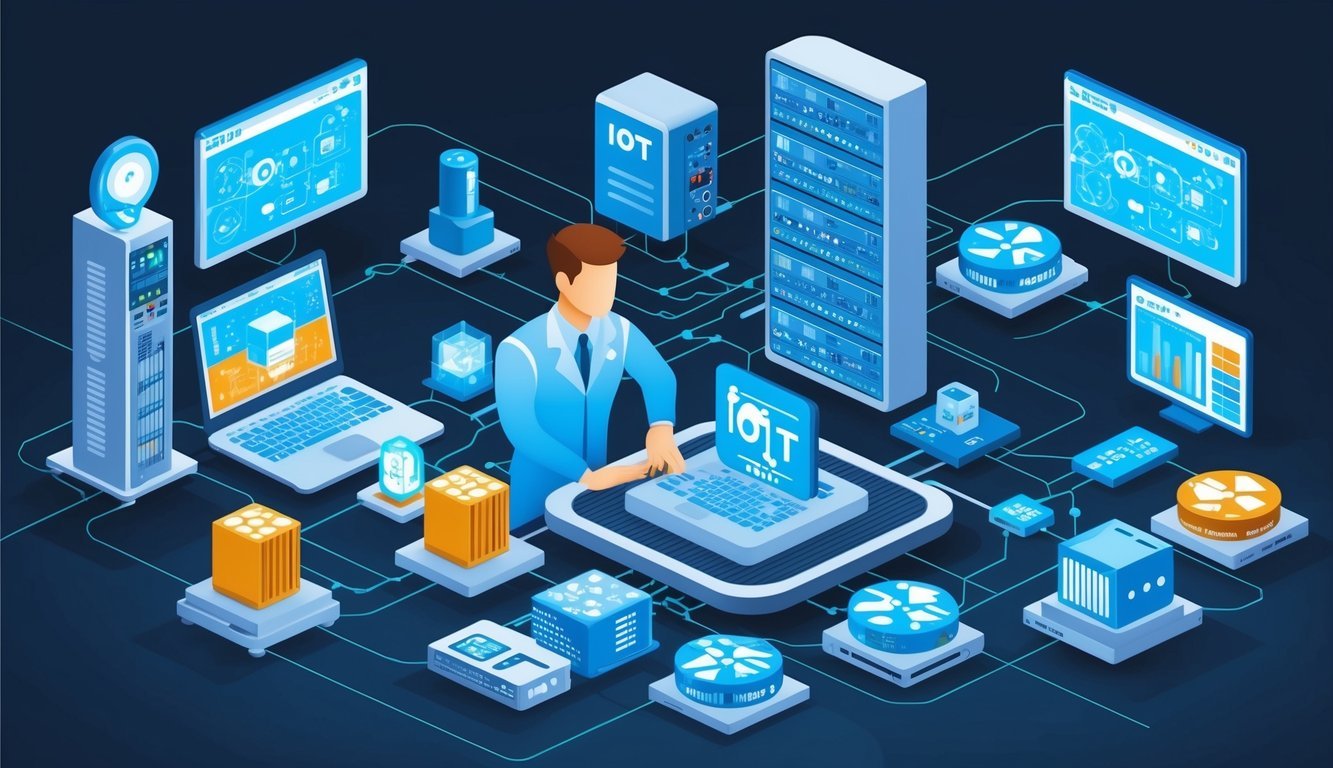
As an Industrial IoT Technician, you can tap into a growing field that combines industrial expertise with cutting-edge technology.
Your role involves installing, maintaining, and troubleshooting IoT devices in manufacturing and industrial settings.
You’ll work with sensors, actuators, and control systems that optimize production processes.
Your skills will be crucial in helping factories become smarter and more efficient.
This position often requires knowledge of both hardware and software components.
You might find yourself programming PLCs (Programmable Logic Controllers), setting up data collection systems, or analyzing machine performance data.
Your expertise can help companies reduce downtime, improve product quality, and increase overall productivity.
To succeed in this role, you’ll need a strong understanding of industrial processes and equipment.
Familiarity with networking protocols and cybersecurity is also essential, as you’ll be dealing with sensitive industrial data.
Many industries are embracing IIoT, from automotive and aerospace to energy and pharmaceuticals.
This widespread adoption means you’ll have diverse opportunities to apply your skills and earn a competitive salary.
As companies continue to invest in smart manufacturing, your expertise will become increasingly valuable.
You could advance to roles like IIoT Systems Architect or Industrial Automation Specialist as you gain experience.
Consider obtaining certifications in industrial IoT or related fields to boost your credentials.
These can help you stand out in the job market and potentially command higher pay rates.
5) IoT Data Analyst
As an IoT Data Analyst, you can turn vast amounts of data from connected devices into valuable insights.
Companies are constantly seeking professionals who can make sense of the information generated by IoT systems.
Your role involves collecting, processing, and interpreting data from various IoT sensors and devices.
You’ll use advanced analytics tools and techniques to uncover patterns, trends, and actionable intelligence.
By leveraging your skills in data visualization, statistical analysis, and machine learning, you can help businesses optimize their operations and make data-driven decisions.
This could involve improving energy efficiency, predicting equipment maintenance needs, or enhancing supply chain management.
To succeed in this field, you’ll need a strong background in data science, statistics, and programming languages like Python or R. Familiarity with IoT platforms and big data technologies is also essential.
As businesses increasingly rely on IoT-generated data, the demand for skilled analysts continues to grow.
This creates opportunities for lucrative freelance work or full-time positions with companies across various industries.
By becoming an IoT Data Analyst, you can tap into a rapidly expanding market and contribute to the development of smarter, more efficient systems.
Your expertise can help organizations extract maximum value from their IoT investments, making you an invaluable asset in the digital economy.
6) Connected Car Specialist
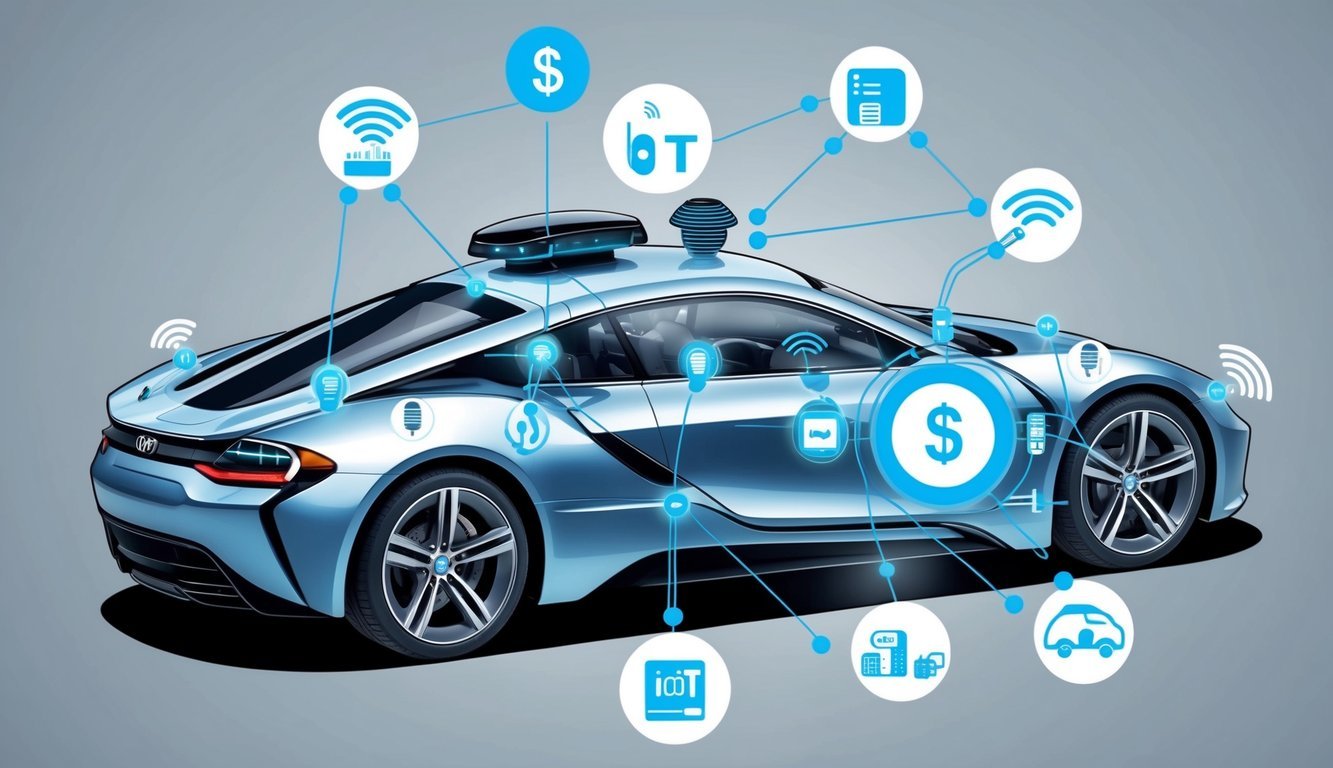
As a connected car specialist, you can tap into the growing automotive IoT market.
Your expertise in integrating internet-connected sensors and devices into vehicles can be highly valuable.
You’ll work on enhancing vehicle functionality, safety, and performance through data collection and analysis.
This role involves implementing advanced telematics, vehicle-to-everything (V2X) communication, and near-field communication (NFC) technologies.
Your skills can help automakers develop smart cars that communicate with external systems.
You might create apps for remote vehicle unlocking or improve GPS and vehicle-to-vehicle communication systems.
Data management is a crucial part of this job.
Connected cars generate massive amounts of data daily, which you’ll need to process and analyze effectively.
As the automotive industry continues to embrace IoT, your expertise in creating internet-enabled vehicles will be in high demand.
You could find opportunities with car manufacturers, tech companies, or automotive startups.
To succeed in this field, you’ll need a strong background in IoT technologies, automotive systems, and data analytics.
Staying up-to-date with the latest trends in connected and autonomous vehicles is essential.
Consider specializing in areas like cybersecurity for connected cars or developing AI-powered features for smart vehicles.
These niche skills can make you even more valuable in the job market.
7) IoT Software Tester
As an IoT software tester, you can turn your technical skills into a profitable career.
Your role involves ensuring IoT devices and systems function correctly and securely.
You’ll conduct various tests on IoT software, including functional, performance, and security testing.
This helps identify and fix bugs before products reach consumers.
Your expertise will be in high demand as companies seek to deliver reliable IoT solutions.
You’ll work with a wide range of devices, from smart home gadgets to industrial sensors.
To succeed in this role, you’ll need strong analytical skills and attention to detail.
Knowledge of programming languages and testing frameworks is also valuable.
You can find opportunities with IoT device manufacturers, software development firms, or as an independent consultant.
Many companies are expanding their IoT offerings, creating a growing job market for testers.
As you gain experience, you can specialize in specific areas like security testing or automation.
This can lead to higher-paying positions and increased job prospects.
To stay competitive, keep up with the latest IoT trends and testing methodologies.
Continuous learning will help you adapt to new technologies and maintain your edge in the field.
Consider obtaining relevant certifications to boost your credentials and earning potential.
These can demonstrate your expertise to potential employers or clients.
8) Smart Agriculture Consultant
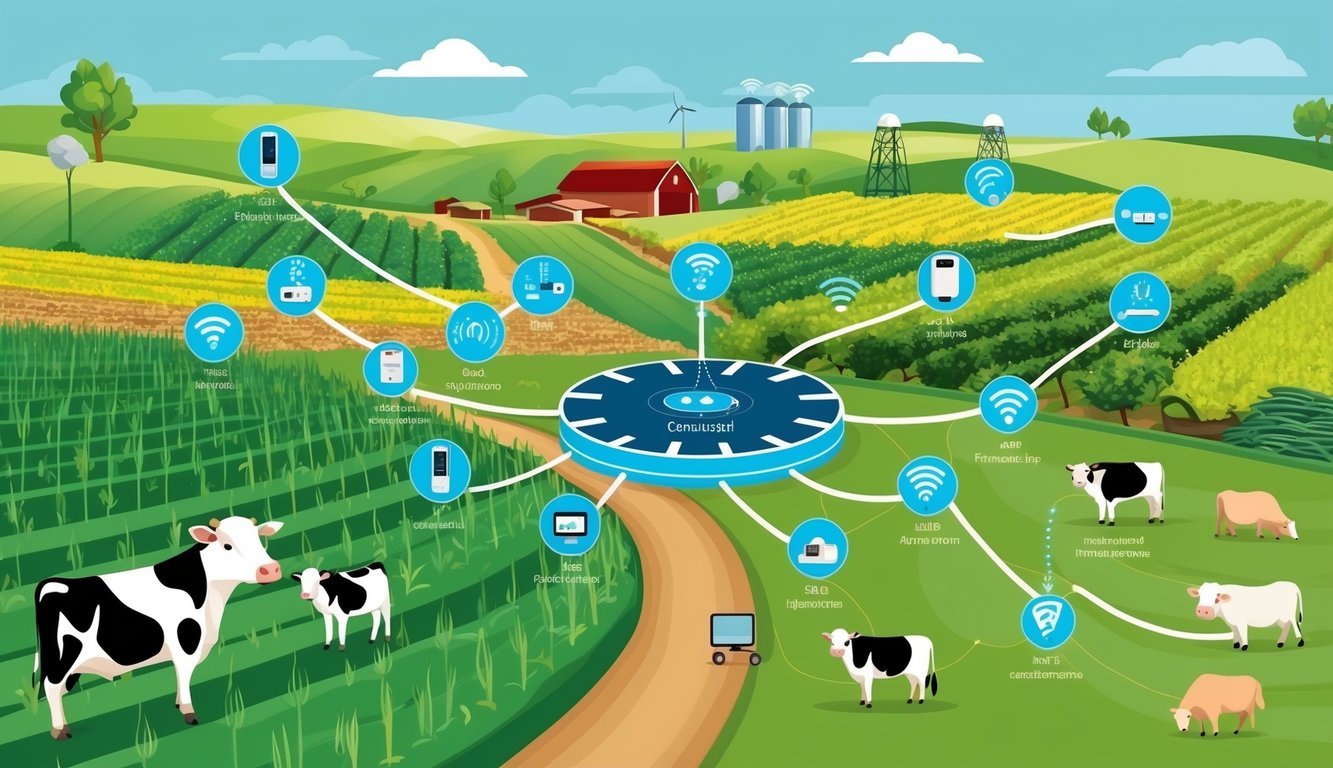
As a Smart Agriculture Consultant, you can leverage your IoT skills to help farmers modernize their operations.
Your expertise in connected devices and data analysis can revolutionize traditional farming practices.
You’ll guide farmers in implementing IoT solutions to monitor soil conditions, crop health, and weather patterns.
These systems provide real-time insights, allowing for more precise decision-making and resource management.
Your role involves recommending and setting up sensor networks across fields.
These sensors collect valuable data on moisture levels, nutrient content, and pest presence.
You’ll then help farmers interpret this information to optimize irrigation, fertilization, and pest control strategies.
Climate monitoring is another crucial aspect of your consultancy.
IoT-enabled weather stations can provide hyperlocal forecasts, helping farmers plan their activities more effectively.
This data-driven approach can significantly reduce crop losses due to unexpected weather events.
You’ll also assist in implementing smart livestock management systems.
IoT devices can track animal health, location, and feeding patterns, improving overall herd management and productivity.
As a consultant, you’ll need to stay updated on the latest IoT technologies in agriculture.
This includes innovations in drone technology for crop surveying and automated farm equipment.
Your ability to integrate these technologies into existing farm operations will be highly valuable.
By helping farmers adopt IoT solutions, you’re not just offering a service – you’re transforming agriculture.
Your expertise can lead to increased yields, reduced resource waste, and more sustainable farming practices.
9) IoT Supply Chain Manager
As an IoT Supply Chain Manager, you’ll leverage your expertise to revolutionize supply chain operations.
Your role involves integrating IoT devices and systems to optimize logistics, inventory management, and overall supply chain efficiency.
You’ll work with smart sensors, RFID tags, and connected devices to track products in real-time.
This allows for better inventory control and reduces losses due to theft or spoilage.
Your skills will be crucial in implementing predictive maintenance solutions.
By analyzing data from IoT-enabled equipment, you can anticipate breakdowns and schedule maintenance before issues arise.
You’ll also be responsible for enhancing supply chain transparency.
IoT technology enables you to provide customers with real-time updates on their shipments, improving satisfaction and trust.
Data analysis will be a significant part of your job.
You’ll interpret vast amounts of data collected from IoT devices to identify trends, optimize routes, and make informed decisions.
As an IoT Supply Chain Manager, you can expect lucrative opportunities.
The market for IoT in supply chain management is projected to reach $41.8 billion by 2033, indicating strong demand for professionals in this field.
Your expertise will be valuable across various industries, from retail to manufacturing.
Companies are increasingly recognizing the benefits of IoT in supply chain management, creating diverse job prospects for skilled professionals like you.
10) Healthcare IoT Consultant
As a healthcare IoT consultant, you can leverage your skills to help medical facilities implement cutting-edge technologies.
Your expertise can transform patient care and streamline operations in hospitals, clinics, and other healthcare settings.
You’ll advise on integrating IoT devices like wearable health trackers and smart medical equipment.
These technologies enable real-time monitoring of patients’ vital signs and provide valuable data to healthcare providers.
Your role may involve designing systems for remote patient monitoring, allowing doctors to track their patients’ health from afar.
This can improve care for those with chronic conditions and reduce hospital readmissions.
You might also help healthcare organizations set up smart hospital infrastructure.
This could include IoT-enabled asset tracking systems to locate medical equipment quickly or environmental monitoring to ensure optimal conditions for patients and sensitive medical supplies.
Data security will be a crucial aspect of your work.
You’ll need to ensure that all IoT implementations comply with healthcare privacy regulations like HIPAA.
The healthcare IoT market is growing rapidly, with projections reaching $289 billion by 2026.
This presents a lucrative opportunity for consultants with the right expertise.
To succeed in this role, you’ll need a strong understanding of both healthcare processes and IoT technologies.
Keeping up with the latest advancements in medical IoT devices and their applications will be essential.
Your services can help healthcare providers improve patient outcomes, increase operational efficiency, and reduce costs.
As the demand for connected healthcare solutions continues to rise, your skills as a healthcare IoT consultant will be increasingly valuable.
11) IoT Security Expert
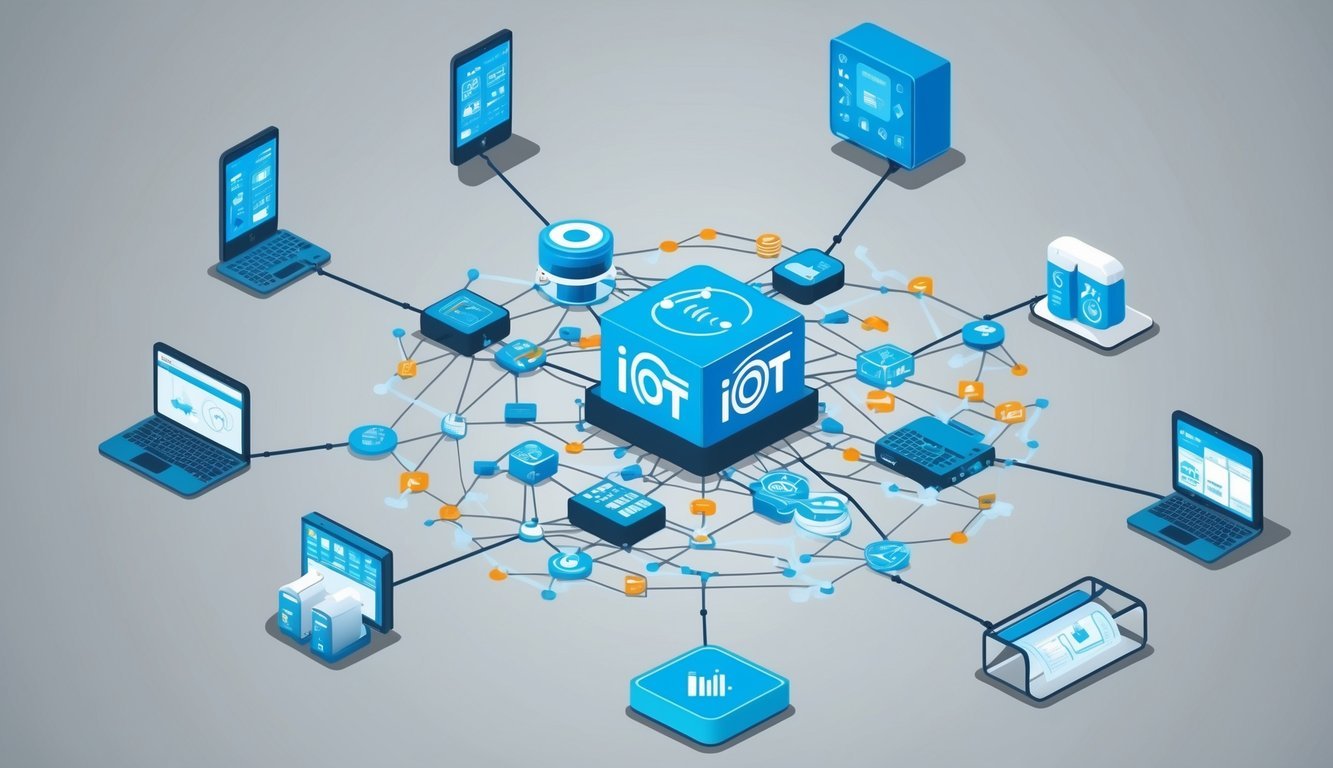
As an IoT security expert, you can capitalize on the growing demand for protecting connected devices and networks.
Your skills in safeguarding IoT systems from cyber threats are highly valuable in today’s digital landscape.
You can offer consulting services to companies implementing IoT solutions.
Help them identify vulnerabilities, develop security protocols, and implement robust protection measures for their connected devices and data.
Consider specializing in specific IoT sectors like smart homes, industrial IoT, or healthcare.
This niche expertise can set you apart and command higher rates for your services.
You might also create and sell IoT security training courses or workshops.
Educate other professionals on best practices for securing IoT networks and devices.
Freelance opportunities abound for IoT security experts.
Many companies seek short-term help to audit their IoT infrastructure or develop security strategies.
You can develop and sell IoT security software or tools.
Create applications that help businesses monitor, detect, and respond to security threats in their IoT ecosystems.
Consider partnering with IoT device manufacturers to improve the security of their products.
Your expertise can be invaluable in designing more secure IoT devices from the ground up.
As an IoT security expert, you’re well-positioned to write and publish content on the topic.
Create blogs, e-books, or whitepapers to establish your authority and attract clients.
Understanding IoT Skills
IoT skills encompass a blend of technical expertise and industry knowledge.
These capabilities enable professionals to design, implement, and maintain interconnected systems that power smart devices and data-driven solutions.
Core Technical Abilities
IoT professionals need a strong foundation in programming languages like Python, Java, and C++.
You’ll work with various hardware platforms and microcontrollers, so familiarity with Arduino and Raspberry Pi is essential.
Networking skills are crucial, as IoT devices rely on protocols like MQTT, CoAP, and HTTP.
Data analytics and machine learning form another vital skillset.
You’ll need to process and interpret large volumes of sensor data to extract meaningful insights.
Cloud computing knowledge is also important, as many IoT solutions leverage cloud platforms for data storage and processing.
Cybersecurity skills are non-negotiable in IoT.
You must understand encryption, authentication, and secure communication protocols to protect connected devices and sensitive data from potential threats.
Industry-Specific Knowledge
Beyond technical skills, you’ll need to understand the specific industries where IoT is applied.
In healthcare, knowledge of medical devices and patient data regulations is crucial.
For smart manufacturing, familiarity with industrial processes and automation technologies is key.
In agriculture, understanding crop management and environmental monitoring helps in developing effective IoT solutions.
For smart cities, knowledge of urban planning and infrastructure management is valuable.
You should stay updated on IoT standards and regulations relevant to your industry.
This includes data privacy laws, industry-specific certifications, and compliance requirements.
Familiarity with IoT platforms and ecosystems specific to your sector will also give you an edge in developing tailored solutions.
Leveraging IoT for Business Opportunities
IoT skills open up exciting avenues for entrepreneurship and career growth.
You can tap into the expanding market by developing innovative solutions and building a personal brand as an IoT expert.
Creating Innovative Solutions
IoT technology presents vast opportunities for creative problem-solving.
You can design smart home devices that enhance comfort and energy efficiency.
Develop wearable tech for health monitoring or fitness tracking.
Create industrial IoT systems to optimize manufacturing processes and reduce downtime.
Consider agricultural applications like soil sensors and automated irrigation.
Explore retail solutions such as inventory tracking and personalized customer experiences.
Look into smart city projects for traffic management or waste collection.
The key is identifying pain points in various industries and crafting IoT solutions to address them.
Start small with a niche product, then expand as you gain traction.
Partner with businesses to pilot your ideas and refine them based on real-world feedback.
Building a Personal Brand
Position yourself as an IoT thought leader to attract clients and job opportunities.
Start a blog or YouTube channel sharing IoT insights and tutorials.
Contribute articles to tech publications and speak at industry events.
Showcase your projects on social media and professional networks.
Highlight case studies of successful IoT implementations you’ve worked on.
Offer free webinars or online courses to demonstrate your expertise.
Engage with the IoT community on forums and social platforms.
Answer questions, provide valuable advice, and build connections.
Consider writing an e-book or creating an online course on IoT fundamentals or advanced topics.
Consistent branding across platforms will help establish your credibility.
Focus on a specific area of IoT to become known as the go-to expert in that niche.
Frequently Asked Questions
IoT offers numerous opportunities for entrepreneurs and professionals to generate income.
Let’s explore some common questions about monetizing IoT skills and technologies.
By leveraging IoT technologies, entrepreneurs can create innovative solutions that improve efficiency and streamline operations across various industries.
Additionally, many professionals are finding ways to monetize their IoT skills by offering consulting services or developing custom applications.
For those looking to diversify their income streams, it’s also vital to understand how to monetize your Instagram account effectively, as social media can serve as a powerful platform for showcasing IoT projects and connecting with a broader audience.
What are some profitable IoT business ideas?
Smart home consulting is a lucrative option.
You can advise homeowners on integrating IoT devices for energy efficiency and convenience.
IoT device repair is another growing field as more connected devices enter the market.
Wearable tech development combines IoT with health and fitness tracking, offering potential for innovative products.
Can you share success stories of entrepreneurs in IoT?
A startup founder developed a smart irrigation system for farmers, reducing water usage by 30%.
Another entrepreneur created a fleet management solution using IoT sensors, helping trucking companies optimize routes and fuel consumption.
A small team built a pet monitoring device that gained popularity among busy pet owners.
What skills do I need to start an IoT-based service?
Programming languages like Python or C++ are essential.
Familiarity with hardware platforms such as Arduino or Raspberry Pi is valuable.
Understanding networking protocols and data analysis techniques will give you an edge.
Knowledge of cloud computing and cybersecurity is also crucial for IoT services.
How can IoT technology be implemented to improve existing products?
Adding sensors to appliances can enable predictive maintenance.
Integrating IoT into vehicles can enhance safety features and fuel efficiency.
Incorporating IoT into manufacturing equipment can optimize production processes and reduce downtime.
Smart packaging with IoT technology can improve supply chain tracking and product freshness.
Are there opportunities for freelancers in the IoT industry?
IoT data analysts are in high demand.
You can offer services analyzing data from IoT devices to help businesses make informed decisions.
Industrial IoT technicians can find contract work setting up and maintaining connected systems in factories.
Freelance IoT security consultants are sought after to protect networks of connected devices.
Which industries are eagerly adopting IoT solutions?
Healthcare is embracing IoT for remote patient monitoring and equipment tracking.
Agriculture uses IoT for precision farming and livestock management.
The automotive industry integrates IoT for connected cars and fleet management.
Smart cities implement IoT for traffic control, waste management, and energy conservation.


